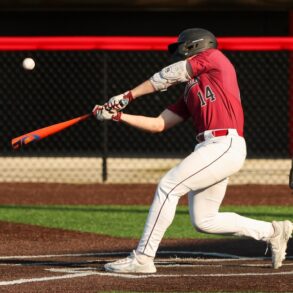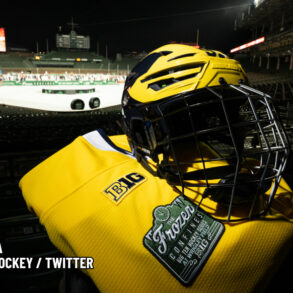The NCAA later this month is expected to release an instructional video detailing procedures for in-game foreign substance checks, according to an agenda for the American Baseball Coaches Association’s annual meeting on rules set for Thursday evening in Washington D.C.
It marks the latest development in the governing body’s crackdown on the presence of overly-tacky substances after a significant number of coaches and administrators expressed concerns that the existing protocol was too passive.
While umpires could choose to investigate if they felt a pitcher was breaking the rules, they were not previously required to do so. Instead, coaches had the power to request examinations of their opponents, a system several high-major Division I coaches described as frustrating, disruptive and largely ineffective.
The method has produced just a handful of ejections since 2022, including Vanderbilt’s JD Thompson during an SEC game against Florida on April 20, 2024, and former Michigan righty Willie Weiss in the 2022 Big Ten Tournament.
Many coaches are confident the issue is much more prevalent than the rate of ejections might suggest.
One coach told Baseball America he believes his team saw “no fewer than a dozen” scenarios in which opposing pitchers showed signs of utilizing a stickier substance than allowed to boost their arsenal, but all “just got away with it.”
ABCA executive director Craig Keilitz also voiced concerns about players giving themselves an advantage and slipping through the cracks undetected.
Keilitz told Baseball America in December that he viewed the matter as one of the most pressing ahead of the 2025 coaches convention.
“Maintaining the integrity of our sport is critical,” he said. “You can count on the foreign substance conversation to continue.”
One mid-major coach who will be in attendance for this year’s ABCA convention told Baseball America that rules pertaining to foreign substances will be his primary focus throughout the four-day event.
“It’s probably the most important thing to me,” he said. “Zero tolerance should mean zero tolerance. Not, ‘We’ll check when we’re told to and do something if necessary.’”
The NCAA was initially hesitant to mirror Major League Baseball’s action against foreign substances, which began partway throughout the 2021 season with mandatory in-game checks in response to soaring spin and strikeout rates.
Major league umpires were first tasked with checking players’ gloves, hats, belt buckles and hands. The league subsequently limited the scope of the search to pitcher’s hands, which is the expectation for the NCAA, according to multiple sources.
Coaches are still expected to be able to request checks, too.
“I think when it comes to the foreign substance checks, we just feel that it’s really important to ensure that players and coaches feel as though things are being done in the most fair way,” Keilitz said. “For us right now, I think that looks like starting to utilize some of the methods Major League Baseball uses, and we’ll see how that impacts things.”
In addition to increasing checks throughout games, the NCAA has also heightened the severity of punishments for offenders.
Starting in 2025, any offender and his team’s head coach will receive immediate ejections from the contest. Four-game suspensions for starting pitchers and two-game suspensions for relievers will subsequently be levied.
“We find that most coaches are in favor of this,” Keilitz said.
The NCAA’s effort to strengthen rules related to integrity this offseason was not limited to foreign substances on the mound, either.
Bat testing prior to each game will debut in 2025 after the measure was previously required only once before a series. Daily bat testing was only a recommendation from the NCAA to its member conferences in 2024.
“The discussion we had centered on the integrity of the sport,” said Doug Aiken, committee chair and associate director of athletics and compliance at Chapman University, said in a statement in 2023. “We want to emphasize that conferences look at what is best when it comes to bat testing, and that it can be done more frequently than what is currently required.”
The NCAA will also discuss the usage of a double bag at first base, changes to their 10-run mercy rule system, copying the MLB model of placing a runner on second to begin extra innings and expanded usage of technology in the dugout at this year’s ABCA convention.
“We need to see if there’s an appetite for some of these changes so that we can start the process of bringing them forward,” Keilitz said. “If there is an appetite, we’ll formally survey our coaches, and if they feel like that’s something we should move in the right direction with, we would.”
This post was originally published on this site be sure to check out more of their content.






